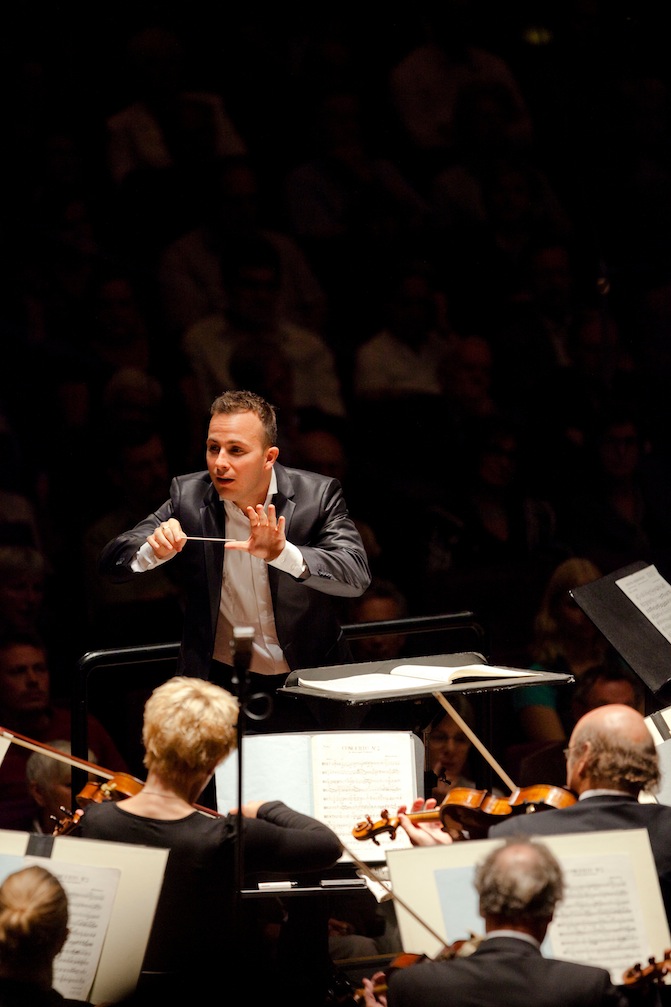Philadelphia Orchestra’s “Resurrection” performance belatedly raises the dead

Yannick Nézet-Séguin led the Philadelphia Orchestra in Mahler’s Symphony No. 2 Friday night at Carnegie Hall. File photo: Marco Borgrreve
Expectations were high for the Philadelphia Orchestra’s visit to Carnegie Hall on Friday. For the past several years, under the baton of Yannick Nézet-Séguin, this ensemble has regained its vaunted place in the top tier of American orchestras, and Mahler’s Symphony No. 2 (“Resurrection”) seemed a perfect vehicle for these musicians to create a truly stunning performance.
Yet Friday’s concert failed to live up to the anticipation–the orchestra’s playing was polished, and their sound as rich and distinctive as ever, but the full weight of this imposing symphony was never realized.
Nézet-Séguin is one of the more fiery young conductors out there. Occasionally his performances might lack polish, or feel overwrought; but until Friday I had never heard him be cautious, and caution is hardly called for in this piece.
The forces at Nézet-Séguin’s command were powerful, as was evident from the very start of the symphony. The threatening scales that constitute its opening flourishes were tossed off in torrents of pitch-dark sound, an initial outburst that quickly gave way to the plodding exhaustion of the march.
At the extremes, Nézet-Séguin’s interpretation made powerful statements, creating desolate quiet or shattering thunder. His pacing was excellent, his balancing clear, but he did not seem fully invested in the performance. The wide territory in between those dynamic extremes felt diffuse, and there was far less variety than we are used to hearing from this passionate conductor.
There was grace and beauty in the Andante moderato, but the musuc was missing its sense of grand sweep, again because Nézet-Séguin was shy about allowing the music to swell to great heights. The third movement was more in character, cheeky at its opening and at times effortlessly suave. Cool, seductive wind playing was supported with ample cushion from the velvet of the strings.
The two female soloists on Friday nearly propelled the performance on their own, beginning with the English mezzo-soprano Sarah Connolly. At this point in her career, there is not a great deal of warmth in her sound, but there is life and amazing color in it. Her interpretation of the “Urlicht” began introspective, even shy, but became dazzling as it came out of its shell. When she reentered in the finale, her interjection of “O glaube, mein Herz” was searing, dark-hued, and coursing with a sense of urgency. Meanwhile, Angela Meade’s spacious soprano was luminous, bursting into the music as though through the clouds.
Only in the last movement did Nézet-Séguin really begin to paint on the massive scale of which he is capable. It opened with explosive power, a thrilling, no-holds-barred approach that perfectly contrasted the inspired bliss that was to follow. The Philadelphia strings are deservedly renowned, but the brass held their own on Friday, nowhere more than in the sprawling middle section of this movement. There was a quality of distance, even distraction in their playing (both onstage and in the wings), but also a focus that allowed them to capture attention even at a low dynamic.
The Westminster Symphonic Choir, made up of students from the Westminster Choir College in Princeton, was splendid, entering with a lovely hush. They amassed superb power in the glorious, ringing, heart-filling close, which provided a satisfying ending to what had been on the whole an oddly constrained performance.
There were no latecomers, but there was a great deal of what sounded like walkie-talkie chatter coming from outside the doors, which periodically opened and then clapped shut. The disturbances may have had something to do with the camera crew recording the performance, but the hall staff is supposed to prevent distractions, not create them.
The Philadelphia Orchestra returns to Carnegie Hall on December 5 to perform Brahms’ Symphony No. 3, the suite from Strauss’s Der Rosenkavalier, and Haydn’s Cello Concerto in C Major with Jean-Guihen Queyras as soloist. carnegiehall.org
Posted Nov 01, 2014 at 11:01 pm by jbassett
I question the reviewer’s perspective As a member of the audience at Carnegie Hall on 10/31 , which as an organic corps rose for a spontaneous and sincere recognition of a gifted rendition of a monumental work debuted in America by its creator in 1908 in this same venue, I wish to say that the performance of the Philadelphia Orchestra , its Conductor, the featured soloists and the gifted Westminster Choir rose to the level of magic . I am willing to respectfully explore this reviewer’s technical comments and perceptions , but trust me, the audience was too engaged with the totality of the offering from the stage to allow any theoretical shortcomings to detract from an evening that paid dividends that will be always be valued. A truly bona fide assessment should center around the connection between the unfolding dynamic among the creator/performers/ and audience rather than a review keyed to capture a cute, back-page ” NY rag ” catch phrase headline.